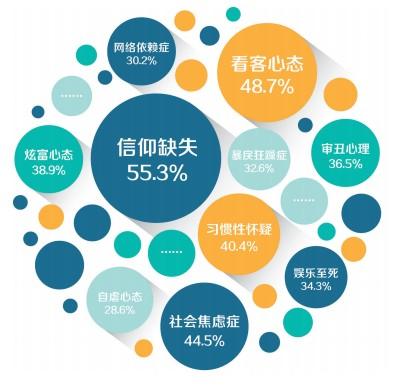Critics will find confirmation of some of their most biting assessments of the Chinese regime in a recent survey done by—a Communist Party mouthpiece? The survey details the Chinese people’s lack of trust and faith in Chinese society, along with the various “abnormal mental states” the Chinese people suffer.
Most striking among these was the 13th: “Self hatred,” which was described as those who “Attack the Communist Party and hate the political system, who attack the system more ferociously the more they benefit from it.”
For the masses, who are more likely to be subject to arbitrary power than benefit from privilege, a dozen other pathologies were listed. These included “hedonism worship,” “a spectator mentality,” “ingrained suspiciousness,” “ostrich mentality,” “thinking-phobia,” “Internet reliance,” “showing off wealth,” and many more.
Survey participants were asked to rate which issues troubled them the most. The “spectator mentality,” meaning the propensity for Chinese people to merely observe others when in trouble, rather than help out, clocked in at 48.7 percent.
“Social anxiety,” meaning worrying too much about their future welfare, rated 44.5 percent. And just over 36 percent of the people enjoy scandalous things more than beautiful things, which was called the “mentality of appreciating ugliness” (shenchou xinli).
Lack of Faith
But among the most widespread issues identified in the survey was “lack of faith,” which 55.3 percent of respondents reported as the number one problem.
“Everyone acknowledges that there’s a lack of faith in Chinese society, and they see moral problems all around them,” said Yang Fenggang, the director of the Center on Religion and Chinese Society at the University of Purdue, in a telephone interview.
Survey authors said at one point that “Traditional Chinese society was based around local communities, and social groups were organized around an emphasis on virtue and faith.” But in modern society, it continued, over 88 percent of people agree that “faith is lacking, and morals are in decline,” and that this is a common “social sickness.”
Professor Yang said that Chinese people “do understand that this faith should be real faith that has the power of transcendence. It’s not for profit, not for immediate interest, it’s not about idealism—it’s faith.”
He attributed the lack of faith, as a source of moral foundation, to restrictions on religious freedom in China. “Religion, when it is freely chosen by people, provides faith to believers.”
Perhaps the most shocking example of China’s social and moral breakdown in recent years took place in 2011, when a 2-year-old, Yue Yue, was ignored by 18 passersby after being crushed under the wheels of a van, and then a pickup truck, in the streets of Foshan, Guangdong Province. The footage of people walking past the bloodied toddler, for seven minutes, stunned the country.
Throwback?
The survey’s reference to traditional society, in this connection, seemed suggestive. Party leader Xi Jinping recently remarked during a tour of Beijing Normal University, “The classical texts should be embedded in students’ minds, becoming the genes of the Chinese people,” according to the Jieyang Daily.
Xi has also made a point of including many Confucian and classical references in his speeches, and People’s Daily has run special pages explicating his meaning for the masses.
“Maybe this plays into one of Xi Jinping’s bigger emphases on traditional values,” said John Wagner Givens, center associate in the Asian Studies Center and adjunct professor of law at the University of Pittsburgh, in an interview.
“But I always take this idea that we’re returning to traditional values as a source of legitimacy with a grain of salt,” he added. “I got excited about that about 10 years ago when they talked about the xiaokang shehui, and I don’t think particularly much came of that.”
The phrase “xiaokang shehui” is a Confucian term that was used by former Party leader Hu Jintao to mean a “moderately prosperous” society. But the wealth gap in China, and its myriad social pressures and problems, continued to grow over the Hu tenure.
A reversion to authentic Chinese tradition, however, may not have been the antidote the survey writers had in mind in the first place, according to Cheng Xiaonong, the former editor of Modern China Studies, an academic journal.
“They mean traditional communist rule, where everyone believes what the leaders say, and propaganda can be used to manipulate and mobilize the naive masses,” Cheng said. “That’s what they want. That’s what Xi Jinping would like to see, even though it’s no longer that era or time.”






